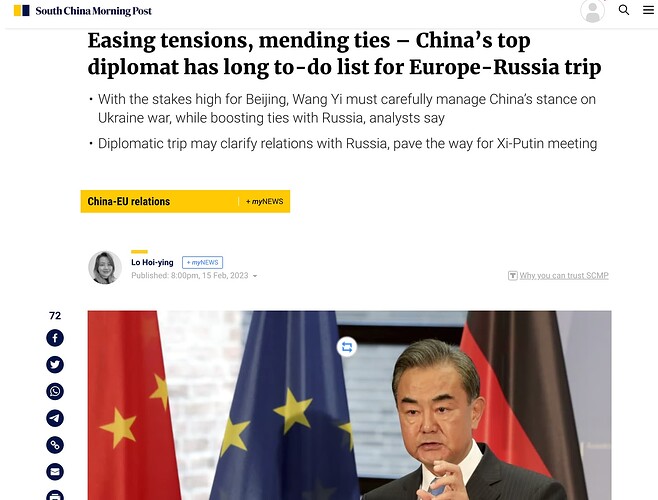-
中国最高外交官王毅将于2月14日至22日访问法国、匈牙利、意大利和俄罗斯。
-
他的访问是在2月24日俄罗斯入侵乌克兰一周年之前。
-
王毅还将于周五出席在德国举行的年度慕尼黑安全会议。
-
王毅此行被认为是努力修补与欧洲国家的关系。
-
这也是他调停乌克兰战争的一个机会。
-
这是自冠状病毒大流行开始以来,中国高级官员首次亲自出席该会议。
-
王毅此行被认为是加强中国和欧洲之间联系的一种方式。
-
这也可能是帮助缓解乌克兰和俄罗斯之间紧张局势的一种方式。
-
他出席慕尼黑安全会议表明了这次访问的重要性。
-
王毅的欧洲之行被视为中国与欧洲国家改善近年来紧张关系的一个机会。
-
十年前成立的16+1贸易集团是一个旨在增加中国在中欧和东欧的贸易和投资的论坛。
-
立陶宛、拉脱维亚和爱沙尼亚在过去两年中由于与北京的关系紧张而退出了该协议。
-
上海华东师范大学国际关系学副教授张昕认为,此行的目的是减少中国与这些国家之间的敌意。
-
这有可能有助于改善中国和欧洲国家之间的关系。
-
这次访问被认为是在改善中国和欧洲国家关系方面迈出的积极一步。
-
人们希望这能导致双方加强合作,使之有更好的贸易和投资机会。
-
王毅的欧洲和俄罗斯之行旨在修补与欧洲国家的关系,同时试图调停乌克兰战争。
-
此行非常及时,因为它正好在2月24日俄罗斯入侵乌克兰一周年之前。
-
王毅还将出席在德国举行的慕尼黑安全会议,这是自冠状病毒大流行开始以来第一位亲自出席的中国高级官员。
-
分析人士说,王晓初在访问期间必须努力向欧盟保证中国的和平崛起。
-
此行的部分目的是缓解与匈牙利和意大利等国家以及16+1贸易集团成员的紧张关系。
-
在安全会议上,王毅将解决争议问题,并解释北京在其他国际问题上的立场。
-
在俄罗斯,王毅打算讨论 "共同关心的国际和地区问题 "的双边关系。
-
分析人士预计,中国不会在乌克兰问题上与俄罗斯采取激进的立场,而是会维持现状。
-
然而,王毅还必须处理好中国与美国的关系,因为在所谓的间谍气球问题上,双方关系紧张。
-
中国提出要在俄罗斯和该地区之间进行调解,但没有积极推动对话或说服任何一方。
-
中国没有资源来解决冲突,他们的立场也不会改变。
-
中国国家主席习近平表示愿意在解决冲突中发挥建设性作用,北京没有谴责莫斯科。
-
中国宣布与俄罗斯建立 "无限制 "的伙伴关系,导致中国和欧盟之间的关系紧张。
-
鉴于新的紧张局势和美国国务卿安东尼-布林肯取消了对中国的访问,北京试图澄清与莫斯科的关系,以消除人们对 "中俄联盟 "反对西方的看法。
-
中国国家主席习近平仍然希望修补与美国的关系,并对描绘一个反对西方的 "中俄联盟 "持谨慎态度。
-
中国寻求促进与俄罗斯的经济关系,并讨论更密切的联合军事合作,特别是通过定期的年度演习。
-
中国国务委员王毅正在访问俄罗斯,作为更大的海外旅行的一部分,而不是只去莫斯科。
-
王毅对俄罗斯的访问被认为是普京和习近平在今年春天晚些时候举行会晤的可能前奏。
-
分析家们关注的是,习近平将如何处理在气球事件发生后不久与普京会面的视觉效果。
-
一个可能的解决方案是扩大习近平在国外的行程,访问其他国家,如欧洲的一些国家,以便先发制人地管理他的俄罗斯之行的视觉效果。
-
China’s top diplomat Wang Yi will be visiting France, Hungary, Italy and Russia from February 14 to 22.
-
His visit is ahead of the first anniversary of Russia’s invasion of Ukraine on February 24.
-
Wang will also attend the annual Munich Security Conference in Germany on Friday.
-
Wang Yi’s trip is seen as an effort to mend relationships with European countries.
-
It is also an opportunity for him to mediate in the Ukraine war.
-
This is the first time a senior Chinese official has attended the conference in person since the start of the coronavirus pandemic.
-
Wang Yi’s trip is seen as a way to strengthen ties between China and Europe.
-
It could also be a way to help reduce tensions between Ukraine and Russia.
-
His presence at the Munich Security Conference is a sign of the importance of the visit.
-
Wang’s trip to Europe is seen as an opportunity for China to improve relationships with European countries that have been strained in recent years.
-
The 16+1 trade group, formed a decade ago, is a forum intended to increase Chinese trade and investment in central and eastern Europe.
-
Lithuania, Latvia and Estonia have left the agreement in the last two years due to tensions with Beijing.
-
Associate Professor of International Relations at Shanghai East China Normal University, Zhang Xin, believes that the purpose of the trip is to reduce hostility between China and these countries.
-
This could potentially help to improve relations between China and European countries.
-
The visit is seen as a positive step forward in terms of improving relations between China and European countries.
-
It is hoped that this could lead to increased cooperation between the two sides, allowing for better trade and investment opportunities.
-
Wang Yi’s trip to Europe and Russia is designed to mend relationships with European countries, while attempting to mediate in the Ukraine war.
-
The trip is timely, as it comes just before the first anniversary of Russia’s invasion of Ukraine on February 24.
-
Wang will also attend the Munich Security Conference in Germany, the first senior Chinese official to do so in person since the start of the coronavirus pandemic.
-
Analysts said Wang must work hard to reassure the European Union of China’s peaceful rise during his trip.
-
Part of the purpose of this trip is to ease tensions with countries like Hungary and Italy, and members of the 16+1 trade group.
-
At the Security Conference, Wang will address the controversy and explain Beijing’s position on other international issues.
-
In Russia, Wang intends to discuss bilateral relations “on international and regional issues of common concern”.
-
Analysts do not expect China to take an aggressive stand on Ukraine with Russia, and will instead maintain the status quo.
-
However, Wang must also manage China’s relations with the US, as tensions simmer over alleged spy balloons.
-
China has offered to mediate talks between Russia and the region, but is not actively promoting conversation or persuading either side.
-
China does not have the resources to resolve the conflict and their stance will not change.
-
Chinese President Xi Jinping expressed willingness to play a constructive role in resolving the conflict and Beijing has not condemned Moscow.
-
China declared “no-limits” partnership with Russia, causing tensions between China and the European Union.
-
In light of new tensions and the cancellation of a China trip by US Secretary of State Antony Blinken, Beijing seeks to clarify its relations with Moscow to dispel perceptions of a “Sino-Russian alliance” against the West.
-
Chinese President Xi Jinping still wants to mend relations with the US and is cautious about portraying a “Sino-Russian alliance” against the West.
-
China seeks to boost economic ties with Russia, and discuss closer joint military cooperation, especially through regular annual drills.
-
Chinese State Councilor Wang Yi is visiting Russia as part of a larger sojourn abroad, instead of only going to Moscow.
-
Wang’s visit to Russia is seen as a possible precursor to a meeting between Putin and Xi later this spring.
-
Analysts are concerned with how Xi will manage the optics of meeting Putin soon after the balloon incident.
-
One possible solution is to expand Xi’s schedule abroad to visit other countries, such as some in Europe, in order to preemptively manage the optics of his trip to Russia.
